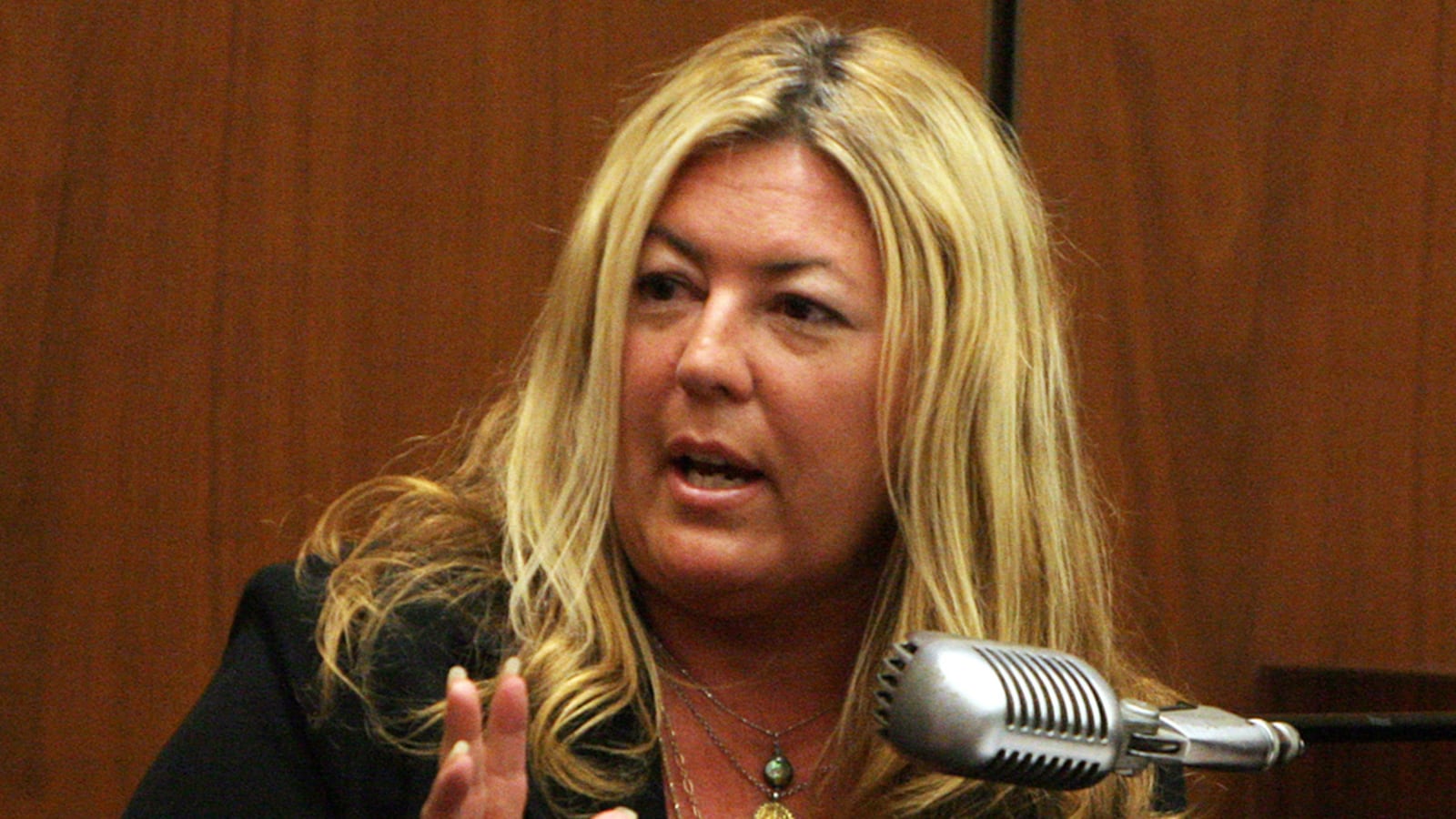As a Hollywood groupie-turned-club-promoter in the late ’90s and mid- 2000s, Punkin Irene Elizabeth Laughlin, better known as Punkin Pie, drew talent such as Slash, Rick James, Gilby Clark, and Rod Stewart to some of L.A.’s hottest clubs.
At the clubs, Laughlin—who once doubled for Kate Capshaw in Indiana Jones and the Temple of Doom—held court with a bevy of Hollywood beauties including blonde sexpot Lana Clarkson, a struggling actress who starred in Roger Corman’s ’80s cult classics Barbarian Queen and Barbarian Queen II: The Empress Strikes Back.
“She was my best friend and she was the love of my life,” recalls Laughlin, who’s promoted such hot spots as the Cat Club, owned by former Stray Cats drummer Slim Jim Phantom, and late music promoter Ian Copeland’s Backstage Café in Beverly Hills. “Lana of all people in the world wanted to be famous. A-list.”
Clarkson’s dream of becoming an A-lister ended in a bang in February of 2003 in the hallway of demure music producer Phil Spector’s mansion in Alhambra, Calif. Spector, who worked with the likes of the Beatles, the Righteous Brothers and Ike and Tina Turner and created the "Wall of Sound" that revolutionized the recording of rock music, was tried twice for Clarkson’s murder and convicted of her shooting death in April of 2009. He was sentenced to 19-years-to-life in prison.

Now Laughlin, who was vilified at Spector’s trial for testifying that Clarkson was in such a state of abject despair that she may have pulled the trigger, is working on a movie project with Vesuvio Entertainment, chronicling her relationship with Clarkson. The movie, tentatively titled All Six Feet, is scheduled to begin filming in early 2013. Laughlin says she is involved in the project partly because she wants to dispel “false rumors” that she was paid millions by Spector to testify for the defense.
“I have been on food stamps and had to scrounge for money,” she says. “I got really sick because of all of the stress and sorrow I had to live through. It has been a real struggle. All I wanted to do was get to the truth.”
Last year, an appeals court refused to consider claims by Spector’s defense attorneys that he did not get a fair trial, saying there was ample evidence to convict the 72-year-old wig-wearing jailbird who had a history of getting drunk and playing with guns around women. That same year, Pulitzer prize–winning playwright David Mamet, who is directing an upcoming HBO movie about Spector’s trial starring Al Pacino and Helen Mirren, caused a stir when he spouted off to the Financial Times that he didn’t think Spector was guilty. “I definitely think there is reasonable doubt,” he told the paper.
The comments were “so wrong and so insensitive in so many ways to the people who knew and loved Lana Clarkson,” wrote the Friends of Lana Clarkson, a group led by Hollywood publicist Edward Lozzi, in a letter to Mamet’s representatives. “Spector was convicted by a jury of his peers,” Lozzi said recently to The Daily Beast. “He is a murderer and you can say it to his face without being sued. We are glad he is where he is rotting away.”
Laughlin, who grew up on a small farm in Oregon, moved in 1988 to Los Angeles, where she worked as a writer’s assistant, a club manager and a VIP hostess before she landed a job as a club promoter at the now defunct nightclub Gem. She met Lana Clarkson at a Halloween party in 1993. “[Lana] and her girlfriend were glammed up to the max,” Laughlin says. “I thought, ‘Oh my lord! Hello Hollywood!’ She was larger than life.”
Clarkson, whose television appearances included parts on Night Court, Silk Stalkings, and Three’s Company, became Laughlin’s plus-one at Hollywood parties, clubs, and concerts. “We used to go to the House of Blues all of the time,” says Laughlin. “She was one of the only girls in the world who knew as much about music as I did. Live music was our passion. When I introduced her to Huey Lewis, she had such a crush on him. She was the queen of imitation and she would imitate the way he talked.”
By early January of 2003, Laughlin says Clarkson was running out of acting jobs and money and began working part-time at the House of Blues as a VIP hostess for the "Foundation Room," a private, members-only area of the club. It was there that Clarkson met Spector on February 3.
The rest is history. They both left together from the Sunset Boulevard club in Spector’s limousine and drove to his mansion. Police received a 911 call from inside Spector’s home at 5:02 a.m. His chauffeur, Adriano De Souza, told police he was waiting in the courtyard to take Clarkson home, when he saw Spector come out of his mansion saying, “I think I killed somebody.” Police found Clarkson dead, seated in Spector’s foyer, her handbag clutched over her shoulder as if she were preparing to go home. A gun had gone off in her mouth. Bits of her broken teeth were scattered along the foyer floor.
Spector was arrested for Clarkson’s murder and his highly publicized first trial began in 2007. Prosecutors painted a picture of an eccentric musical genius with a dark side, who bullied talent in recording studios and threatened female acquaintances at gunpoint, dating back as far as the 1970s.
Laughlin, who spent more than two days on the stand, claimed that Clarkson felt embarrassed by her $9-an-hour job at the House of Blues and that just 10 days before she died wept uncontrollably at a Hollywood party when Transformers director Michael Bay, who cast her for a small role in a Mercedes commercial in 1998, ignored her. Bay, who took the stand as a witness for the prosecution, denied the claim, stating he never disrespected the statuesque beauty. “If I disrespected her she probably would have slapped me,” he testified. “She was just that saucy.”
Laughlin’s testimony was highly controversial, as it became the bedrock of the defense’s claim that Clarkson was distraught over her evaporating career and turning 40, and may have pulled the trigger of the gun that killed her.
“She called me bawling her eyes out,” said Laughlin in a recent interview. “She was so downtrodden. This town was destroying her. She was crying and said, ‘I am getting a gun. I hate the town and I hate the people and I am going to blow my brains out.’”
“What I think is she couldn’t take it anymore and [Spector] said something that was the straw that broke the camel’s back,” Laughlin said. “It was like lighter fluid on a match.”
Prosecutors and Clarkson’s friends questioned Laughlin’s motives and argued that she was out for herself and only looking for a book or movie deal. One of Laughlin’s harshest critics was Los Angeles Deputy District Attorney Alan Jackson, who attacked her credibility and accused her of concocting the story about Clarkson’s state of mind. He also accused her of lying to investigators, and taking money from Spector through the Backstage Café where she worked.
Jackson, who is now running for Los Angeles County district attorney, questioned why Laughlin didn’t come forward to police in 2003 with her claim that Clarkson was despondent. Laughlin testified that she was told by a girlfriend not to speak to the police without a lawyer present and was advised to protect Clarkson’s privacy.
During the trial, Jackson also questioned why Laughlin sent a Christmas card to friends alluding to Spector’s guilt. It read: “My Lana, my best friend, my right arm, my inseparable sister was violently and abruptly taken from me at the hands of Phil Spector.”
Laughlin told The Daily Beast that she sent the cards to be “weirdly politically correct.”
“I couldn’t say what I wanted to say,” she said. “Hell, I wanted him to be guilty. I wish I knew he was guilty.”
Today, Laughlin lives a reclusive life far from the Hollywood music scene that she and Clarkson reveled in years ago. “[Clarkson’s] family turned away from me,” she said. “Everybody turned away from me. I was the red-haired stepchild.”
“Lana was an icon thanks to Roger Corman,” said Lozzi. “When she walked into a room—think of the first time that a new generation saw Charlize Theron walk into a room.”
He added that Laughlin “is not a friend in the Friends of Lana Clarkson. She went along with the defense.”






